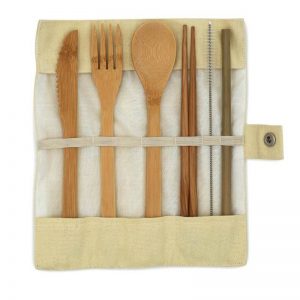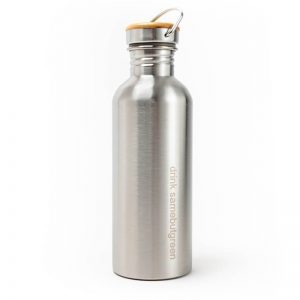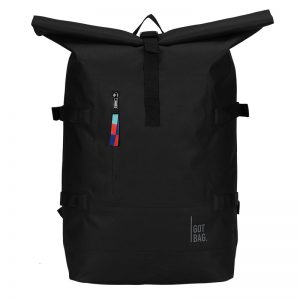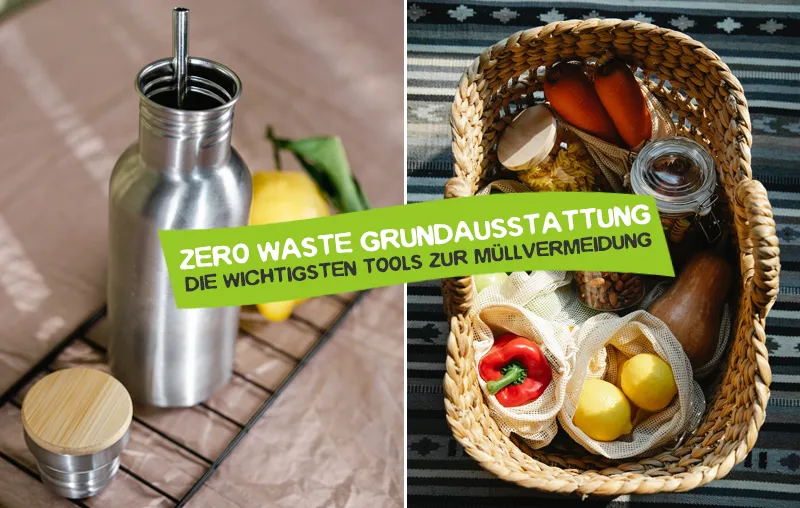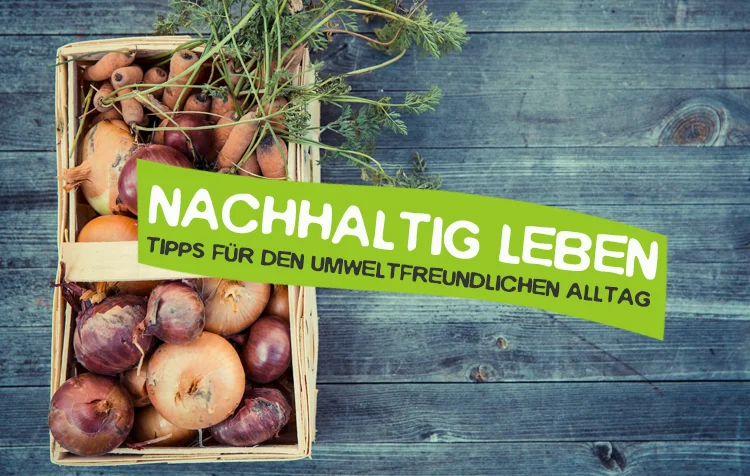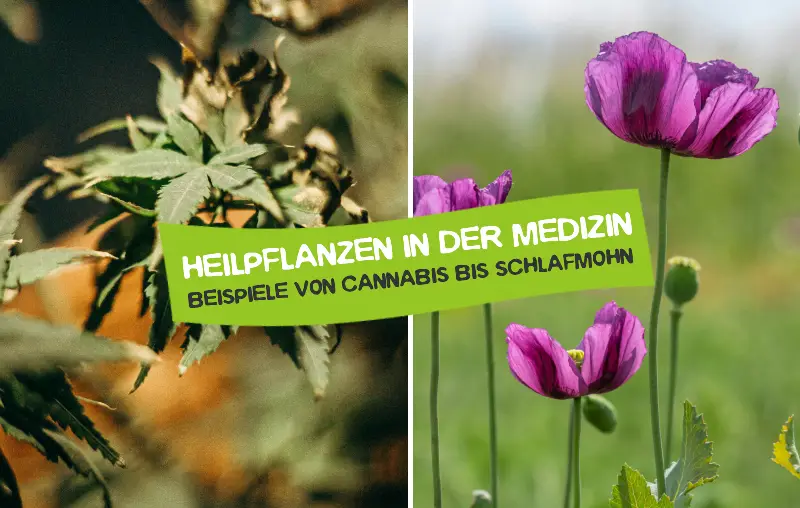Do you want to camp as plastic-free as possible and master your camping vacation without waste? Then you've come to the right place! Pick out your tent and sleeping bag, pack your rucksack and look forward to your time out in the countryside. Then light the campfire and enjoy the peace and quiet of (almost) untouched nature. Camping is great - and basically a beautiful way to do it, to go on a sustainable vacation.
Nevertheless, it is difficult for us to behave in a really environmentally friendly way on this type of vacation. Disposable tableware, plastic packaging for eating and drinking and lots of plastic tubes in our toiletry bags cause a lot of waste, which often ends up as plastic waste in the environment.
With the following 12 tips for zero waste camping, I'll show you how you can also manage to avoid unnecessary waste when camping.
Throwaway Society
Tent, sleeping bag, campfire, outdoor equipment, hiking, nature, camping, backpacking, sustainability, wild camping, camper, stove, waste disposal, camping kitchen, tents, hiking trails, nature experience, trekking, eco-friendly, minimalism.
Tip: If a waste-avoiding attitude is rather new territory for you, you are also welcome to take a look at the basic rules of the Zero Waste Lifestyle throw
Advantages: Why camp with as little waste as possible?
Camping means for me, outdoors in nature to enjoy the fresh air to the full and get away from the hustle and bustle of everyday life. By minimizing your waste and simply camping more consciously, you also respect your natural environment and also benefit from a few other advantages.
Here I have given you as A little extra motivation I've put together my personal reasons for zero waste camping:
- Reduce environmental pollution: By spending your time on the campsite as litter-free as possible, you are also automatically counteracting the Plastic waste in the environment that lingers there forever. In this way, you also protect countless wild animals.
- Conserve resources: By turning your back on single-use products, switching to reusable alternatives and thus avoiding camping waste, you are protecting the natural resources the earth.
- Save money: Reusable products are of course much cheaper in the medium and long term, as you can use them several times. So you save money in a sustainable way.
- Be a role model for other campers: Your sustainable action and your appreciation for nature also inspire others and promote interest in waste-free camping.
The best tips for Zero Waste Camping
Besides a few Karma points you can also get a lot of new experience for a plastic-free camping. environmentally friendly lifestyle collect. Here you will find, as promised, the best tips and advice for this. Let's go!
1. take your own water bottle with you
If you spend a lot of time outdoors, you should also make sure you drink enough. To avoid disposable plastic bottles, it is always worth having your own Stainless steel drinking bottle (or a glass bottle) with you. You can fill it up at campsites, restaurants or public water fountains. For longer trips (and if you have enough space) a water tank is worthwhile.
From experience I know that when camping sometimes you still can not get around the plastic bottles from the supermarket. If that's the case, make sure that you buy a large canister rather than many individual bottles and then dispose of them correctly.
If you really want to enjoy the tranquility of nature completely isolated, a water filter or a so-called Lifestraw can be practical. With these you can free the water from lakes or rivers from germs, chlorine and organic pollutants and thus make it drinkable.
2. use coffee cups and thermos flasks for hot drinks
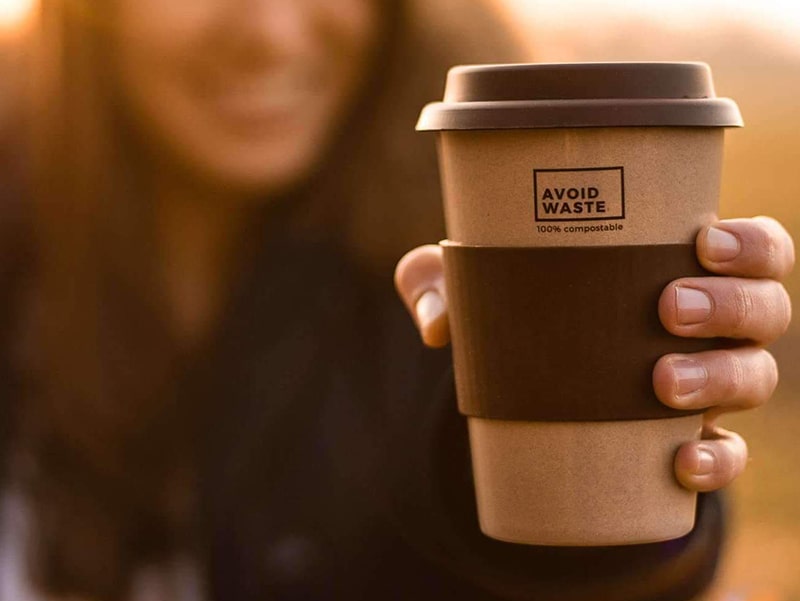
A few warming drinks are also a must on an outdoor trip. To keep your coffee or tea warm for longer, I recommend thermos flasks (which in turn also keep cold water cool). With a Reusable cup you can also get a coffee on the way, without having a guilty conscience because of the many disposable cups. This is also part of plastic-free camping.
3. store food in reusable cans
Especially for hikes is a Stainless steel lunch box super suitable to take a bit of provisions with you. Even more space-saving are coated bread bags or Oilclothsthat you can wrap your sandwiches in, for example. You can also use reusable tins to store a few leftovers after cooking in the evening and thus reduce food waste.
Tip: You can find more tips about this in the article about the Reduction of food waste.
4. bring your own dishes and cutlery
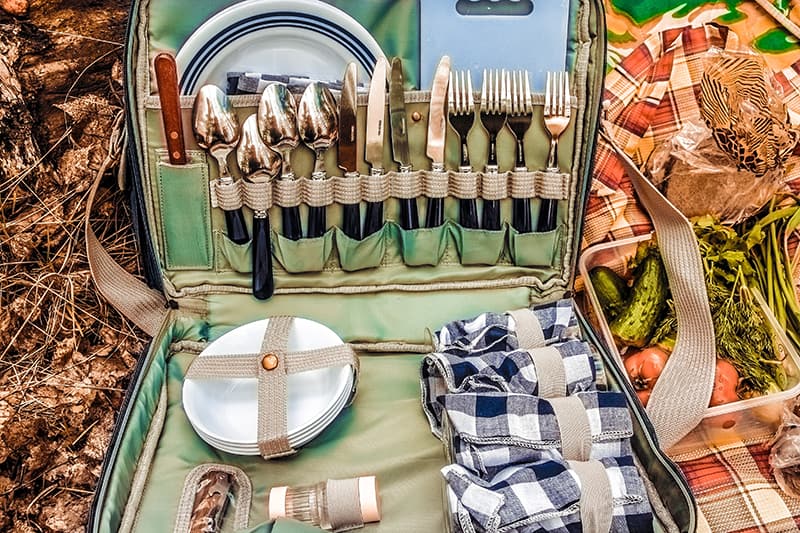
With your own tableware and cutlery you save unnecessary disposable products. Lightweight tableware (e.g. made of bamboo) and multifunctional travel cutlery (e.g. knife, fork and spoon in one) are very practical. But of course, you don't have to equip yourself with every possible outdoor gadget, but can also use your Cutlery set take from home.
5. use cloth towels
A Fabric napkin for eating, a tea towel for drying off or wiping up quickly, a cloth handkerchief for blowing your nose - as you can see, there are lots of ways to replace the disposable kitchen roll or pack of tissues with reusable cloth alternatives.
Cloth towels are the absolute all-purpose weapon for avoiding waste - and not just for zero waste camping.
6. take basic provisions with you unpacked
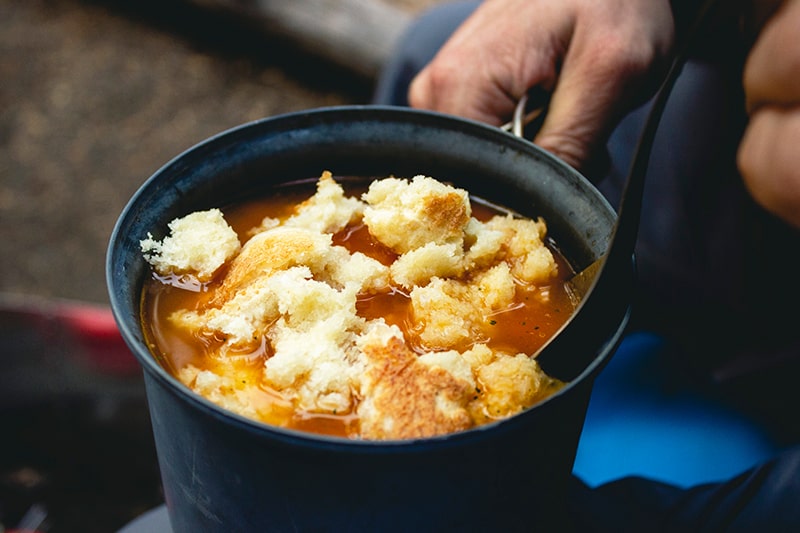
Depending on where you set up camp, it may be difficult with the plastic free shopping can be a little difficult. There are often smaller supermarkets near campsites, but we are also familiar with the sometimes very limited range of unpackaged products in the city.
To avoid a "plastic-rich emergency purchase", you can bring some basic provisions from home - for example bread, spreads in jars, vegetables and fruit, pasta, rice and sauces in jars.
7. take a rucksack or cloth bag with you when you go shopping
If you are traveling for a longer period of time, you obviously can't take all your provisions with you. To save on plastic when you go to the nearest supermarket, you can simply take a few cloth bags or Fruit and vegetable nets from home and thus at least buy fresh food plastic-free.
8. sink with reusable utensils
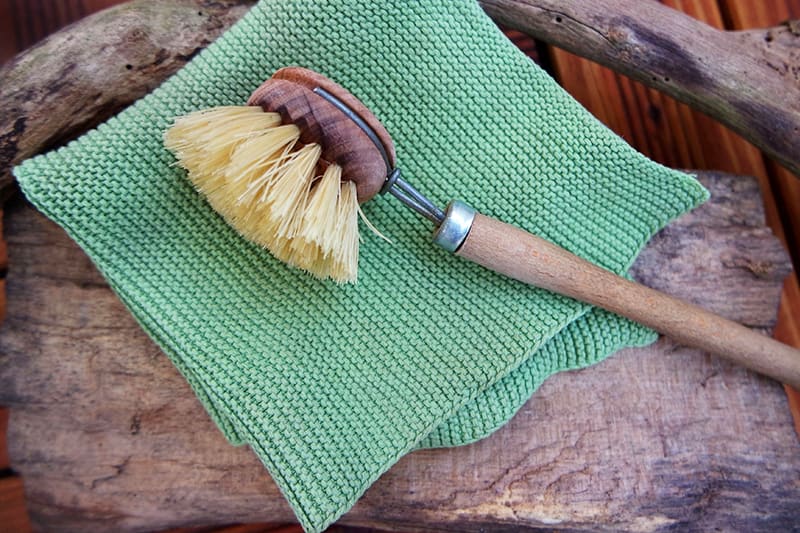
It's also worth bringing sustainable alternatives for washing your dishes. A reusable cotton dishcloth or a Wooden dish brush not only replace the disposable variants in your own household, but also help you save waste when you're out and about.
9. fill rinsing agent and washing powder in advance
To avoid having to resort to small travel tubes of washing powder and cleaning bottles at the nearest supermarket, fill a little bit at a time of your supplies into small jars or cans at home.
But you can also simply within a few minutes Making washing up liquid from ivy yourself. Also Washing powder is in own production possible. This makes plastic-free camping even more educational.
10. use solid shampoo and a bar of soap
You can also save a lot of plastic waste with your cosmetic products if you opt for solid soap and shampoo bars or Hair soap decided. You can find these in unpackaged stores and now also in every drugstore in cardboard packaging. The great thing about solid soaps and shampoos is not only the saved plastic, but also that they are particularly compact, fit in any bag and last longer than the liquid version. For me, an absolute must when zero waste camping.
11. brush your teeth with a bamboo toothbrush and toothpaste tablets
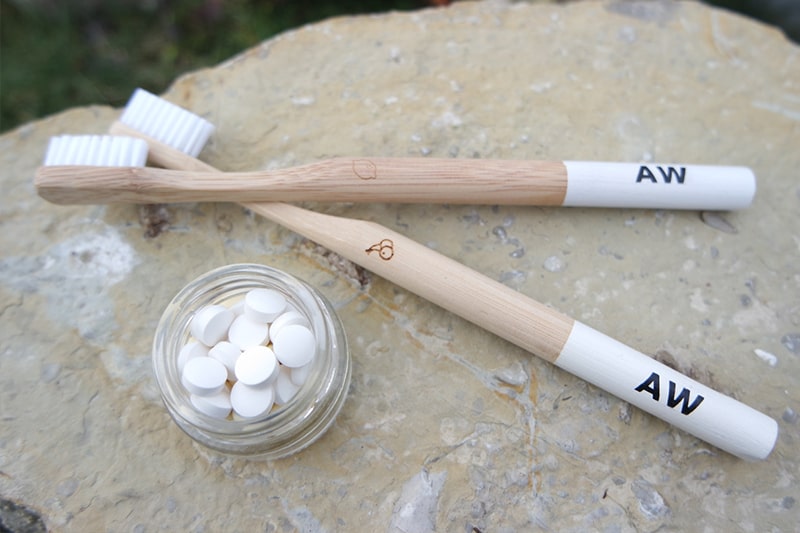
Use a Bamboo toothbrush and take in a small tin tooth powder or Toothbrush tablets with. Toothpaste tablets are particularly practical because they are not only small and quick to stow away, but can also be portioned exactly for your trip. You can also save plastic waste by using toothpaste in a jar.
12. pack some solid deodorant
You can already buy plastic-free spray deodorant or deodorant cream in glass bottles and jars at the drugstore, or filled in unpackaged stores. Here at CareElite, you'll also find a simple guide on how to make your make natural deodorant from home remedies yourself can. Especially convenient here is also that you can make only the amount you need for your camping trip and thus avoid unnecessary ballast.
Important: If you are in direct nature, without sanitary facilities nearby, make sure that your cosmetics contain only natural, biodegradable ingredients to avoid leaving chemicals in nature. This applies to all products you use for rinsing, washing and body cleansing. Microplastics in cosmetics you unmask, for example, with the smartphone App Codecheck.
Waste separation and disposal when camping
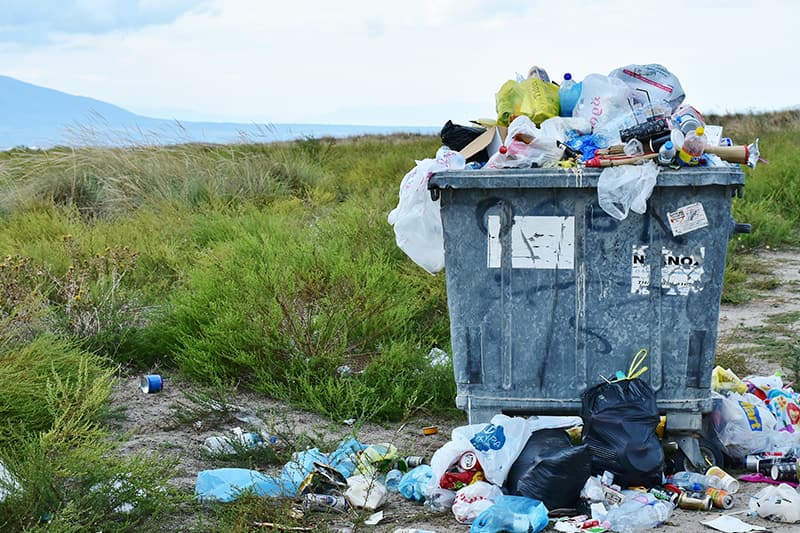
Of course, it's great if you manage to get through your camping trip completely zero waste, but as always, don't stress too much and try your best. If you do end up with some trash, be sure to check out the correct waste separation and disposal. It is best to collect it and dispose of it at the next opportunity at a rest area or campsite.
Unfortunately, waste separation containers are not yet available everywhere. If you have the space, take your garbage home with you and separate it properly there. In any case, it is helpful to bring 2 bags with you so that you can at least sort your waste directly on site. Plastic and separate residual waste.
Plastic-free camping without garbage - is that possible?
Plastic-free camping without leaving behind big piles of trash can definitely work. As you've read, with a little preparation and a few more products you take from home, you can save a lot of Save plastic. With Zero Waste Camping you save resources, do something good for the wonderful nature and can enjoy your trip with a clear conscience.
"Take only memories, leave only footprints."
Chief Seattle (more at Travel quotes)
Have you been on a plastic-free camping vacation yourself and have any other tips for avoiding waste while camping? Feel free to share your experiences and tips in the comments.
Stay sustainable,

PS: I have also written an article about the Zero waste hiking written. If you're regularly gripped by a thirst for adventure, then be sure to check it out next.

